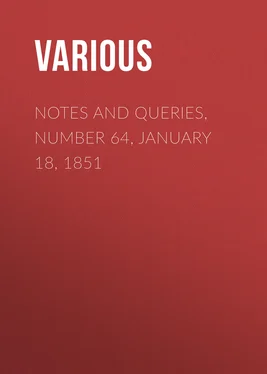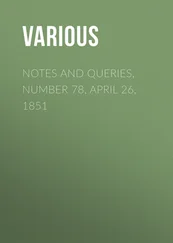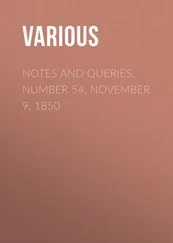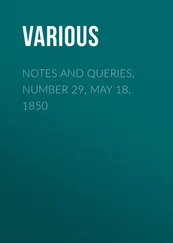Various - Notes and Queries, Number 64, January 18, 1851
Здесь есть возможность читать онлайн «Various - Notes and Queries, Number 64, January 18, 1851» — ознакомительный отрывок электронной книги совершенно бесплатно, а после прочтения отрывка купить полную версию. В некоторых случаях можно слушать аудио, скачать через торрент в формате fb2 и присутствует краткое содержание. Жанр: foreign_antique, periodic, foreign_edu, на английском языке. Описание произведения, (предисловие) а так же отзывы посетителей доступны на портале библиотеки ЛибКат.
- Название:Notes and Queries, Number 64, January 18, 1851
- Автор:
- Жанр:
- Год:неизвестен
- ISBN:нет данных
- Рейтинг книги:3 / 5. Голосов: 1
-
Избранное:Добавить в избранное
- Отзывы:
-
Ваша оценка:
- 60
- 1
- 2
- 3
- 4
- 5
Notes and Queries, Number 64, January 18, 1851: краткое содержание, описание и аннотация
Предлагаем к чтению аннотацию, описание, краткое содержание или предисловие (зависит от того, что написал сам автор книги «Notes and Queries, Number 64, January 18, 1851»). Если вы не нашли необходимую информацию о книге — напишите в комментариях, мы постараемся отыскать её.
Notes and Queries, Number 64, January 18, 1851 — читать онлайн ознакомительный отрывок
Ниже представлен текст книги, разбитый по страницам. Система сохранения места последней прочитанной страницы, позволяет с удобством читать онлайн бесплатно книгу «Notes and Queries, Number 64, January 18, 1851», без необходимости каждый раз заново искать на чём Вы остановились. Поставьте закладку, и сможете в любой момент перейти на страницу, на которой закончили чтение.
Интервал:
Закладка:
3.
"One Kisse more and y nfarewell
Oh no, no more,
I prethee giue me o re.
Why cloudest thou thy beames,
I see by these extreames,
A Woman's Heaven or Hell.
Pray the King may haue his owne,
And the Queen
May be seen
With her babes on England's Throne.
Rally up your Men,
One shall vanquish ten,
Victory we
Come to try thee
Once agen.
Query: Who was the author of the above?
F.H.GRAY'S ELEGY
J.F.M. (Vol. i., p. 101.) remarks, "I would venture to throw out a hint, that an edition of this Elegy , exhibiting all the known translations, arranged in double columns, might be made a noble monument to the memory of Gray." It has been asserted that there is scarcely a thought in this Elegy that Gray has not borrowed from some writer, ancient or modern and if this be true, I would take the liberty of adding a hint to that of J.F.M., namely, that the proposed edition should contain a third column, exhibiting all the known plagiarisms in this famous Elegy . To begin with the first line—
"The curfew tolls the knell of parting day."
Lord Byron, in his notes to the third canto of Don Juan , says that this was adopted from the following passage in Dante's Purgatory , canto viii.:
—– "si ode squilla di lontano
Che paja 'l giorno pianger che si muore."
And it is worthy of notice that this passage corresponds with the first line of Giannini's translation of the Elegy, as quoted by J.F.M.:—
"Piange la squilla 'l giorno, che si muore."
I must add, however, that long before Lord Byron thought of writing Don Juan , Mr. Cary, in his excellent translation of the Italian poet, had noticed this plagiarism in Gray; and what is more, had shown that the principal thought, the "giorno che si muore," was borrowed by Dante from Statius's
"Jam moriente die."
St. Lucia, West Indies, Nov. 1850.
[The preceding communication was accompanied by several others, and by the following gratifying letter, which we print as a fresh proof that our paper is fulfilling the object for which it was instituted, namely, that of promoting literary intercourse between men of letters throughout the world and that it is as favourably received by our fellow countrymen abroad, as it has been by those who are enabled to receive it wet from the press:—
"Owing to the difficulty of procuring the early numbers of 'NOTES AND QUERIES,' especially at this distance from Britain, I have been compelled to wait for its publication in a collected form. I am now in possession of the first volume, and beg leave to offer you a few Notes which have occurred to me on perusing its contents. I am fully sensible of the disadvantage of corresponding with you from so remote a corner of the globe, and am prepared to find some of my remarks anticipated by other correspondents nearer home; but having deeply suffered from the literary isolation consequent upon a residence of twenty-one years in this country, I shall gladly submit to any disadvantage which shall not involve a total exclusion from the means of inter-communication so opportunely afforded by your excellent periodical.
"HENRY H. BREEN."]THE NINEVEH MONUMENTS AND MILTON'S NATIVITY ODE ILLUSTRATED FROM LUCIAN
Layard in his Nineveh , vol. ii., p. 471., in his description of "the sacred emblems carried by the priests," says, they are principally the fruit or cone of the pine.
"… and the square utensil which, as I have already remarked, appears to have been of embossed or engraved metal, or of metal carved to represent wicker work, or sometimes actually of wicker work."
He adds, that M. Lajard "has shown the connection between the cone of the cypress and the worship of Venus in the religious systems of the East;" that it has been suggested that "the square vessel held the holy water," that, "however this may be, it is evident from their constant occurrence on Assyrian monuments, that they were very important objects in religious ceremonies. Any attempt to explain their use and their typical meaning, can at present be little better than ingenious speculation."
There is a passage in Lucian De Dea Syria , §. 13., which may serve to elucidate this feature in the Nineveh marbles. He is referring to the temple of Hierapolis and a ceremony which Deucalion was said to have introduced, as a memorial of the great flood and the escaping of the waters:
"Δις εκαστου ετεος εκ θαλασσης υδωρ ες τον νηον απικνεεται· φερουσι δε ουκ ιρεες μουνον αλλα πασα Συριη και Αραβιη, και περηθεν του Ευφρητεω, πολλοι ανθρωποι ες θαλασσαν ερχονται, και παντες υδωρ φερουσαι, τα, πρωτα μεν εν τωι νηωι εκχρουσι," &c.
"Twice every year water is brought from the sea to the temple. Not only the priests, but" all Syria and Arabia, "and many from the country beyond the Euphrates come to the sea, and all bring away water, which they first pour out in the temple," and then into a chasm which Lucian had previously explained had suddenly opened and swallowed up the flood of waters which had threatened to destroy the world. Tyndale, in his recent book on Sardinia, refers to this passage in support of a similar utensil appearing in the Sarde paganism.
It may be interesting to refer to another passage in the Dea Syria , in which Lucian is describing the splendour of the temple of Hierapolis; he says that the deities themselves are really present:—
"Και Θεοι δε καρτα αυτοισι εμφανεες· ιδρωει γαρ δη ων παρα σφισι τα ξοατα,"
When the very images sweat, and he adds, are moved and utter oracles. It is probable Milton had this in recollection when, in his noble Nativity Ode , he sings of the approach of the true Deity, at whose coming
"… the chill marble seems to sweat,
While each peculiar power foregoes his wonted seat."
MINOR NOTES
Gaudentio di Lucca. —Sir James Mackinstosh, in his Dissertation on the Progress of Ethical Philosophy , adverts to the belief that Bishop Berkeley was the author of Gaudentio di Lucca , but without adopting it.
"A romance," he says, "of which a journey to an Utopia, in the centre of Africa, forms the chief part, called The Adventures of Signor Gaudentio di Lucca , has been commonly ascribed to him; probably on no other ground than its union of pleasing invention with benevolence and elegance."— Works , vol. i. p. 132. ed. 1846.
Sir J. Mackintosh, like most other modern writers who mention the book, seems not to have been aware of the decisive denial of this report, by Bishop Berkeley's son, inserted in the third volume of Kippis's Biographia Britannica .
L.George Wither, the Poet, a Printer (Vol. ii., p. 390.).—In addition to DR. RIMBAULT'S extract from Wither's Britain's Remembrancer , showing that he printed (or rather composed) every sheet thereof with his own hand, I find, in a note to Mr. R.A. Willmott's volume of the Lives of the English Sacred Poets , in that interesting one of George Wither, the following corroboration of this singular labour of his: the poem, independent of the address to the King and the præmonition, consisting of between nine and ten thousand lines, many of which, I doubt not, were the production of his brain while he stood at the printing-case. A MS. note of Mr. Park's, in one of the many volumes of Wither which I possess, confirms me in this opinion.
Читать дальшеИнтервал:
Закладка:
Похожие книги на «Notes and Queries, Number 64, January 18, 1851»
Представляем Вашему вниманию похожие книги на «Notes and Queries, Number 64, January 18, 1851» списком для выбора. Мы отобрали схожую по названию и смыслу литературу в надежде предоставить читателям больше вариантов отыскать новые, интересные, ещё непрочитанные произведения.
Обсуждение, отзывы о книге «Notes and Queries, Number 64, January 18, 1851» и просто собственные мнения читателей. Оставьте ваши комментарии, напишите, что Вы думаете о произведении, его смысле или главных героях. Укажите что конкретно понравилось, а что нет, и почему Вы так считаете.












